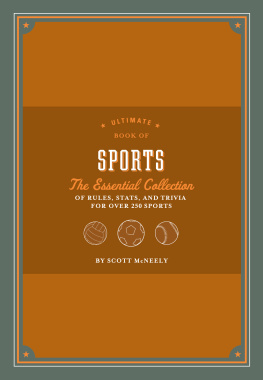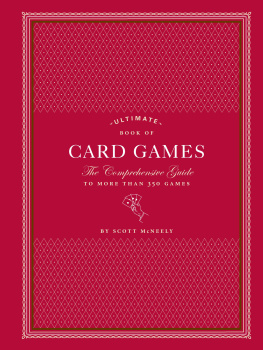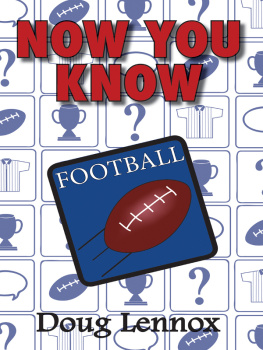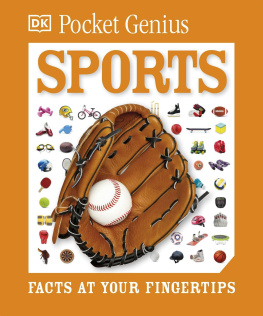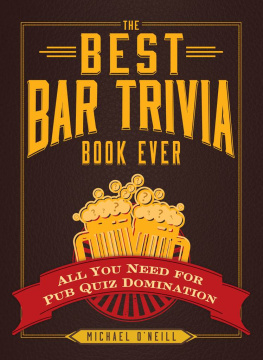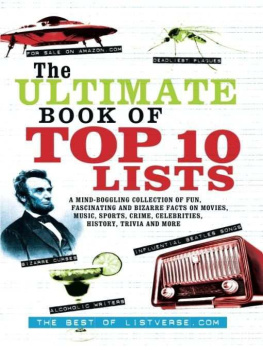IVE NEVER BEEN PARTICULARLY GOOD AT SPORTS.
In the second grade I did invent a game called Trip Potty. I was the potty and classmates would chase me mercilessly at recess in order to trip me. It was easy pickings, owing to the fact that I wore a kind of Dickensian corrective shoe for reasons that elude me to this very day.
In my family it was my grandfather who was Mr. Sporty. He excelled in every sport and even bagged a handful of world record fish. He must have wondered what happened to his sports gene, why it expressed itself so feebly in me.
Perhaps I redeemed myself by playing ice hockey as a preteen and by joining my high schools wrestling and fencing teams (en garde!). Yet I never had the passion of a true sportsman. I rarely watched sports on television. I never wore a football jersey to school.
So why did I write an entire book about sports?
Oddly enough I love the drama of sports. I remember watching my first professional soccer game, at Stamford Bridge in London, the rabid Chelsea fans unlike any I had ever encountered. I remember my first Oakland Raiders football game from the infamous black hole section of the stadium, my first Aussie rules footy game at the MCG surrounded by maniacal Essendon fans, my first World Cup soccer match watching from a pub in Ireland as the Irish defeated Romania 5-4 on penalty kicks. Over and over again Ive learned that sports are chock-full of passion-fueled moments. And Ive learned that passionate people can easily connect with sports.
In my travels Ive been lucky enough to encounter many lessheralded sports, too: oil wrestling in Turkey, camel racing in India, kickboxing in Thailand. For me thats the magic formula, getting caught up in a swirl of emotion and using sport as a lens to access the broader culture (yours or somebody elses). With this perspective in mind, sports are never dull and can never disappoint.
SCOTT MCNEELY


DICTIONARY.COM SPORT as an athletic activity requiring skill or physical prowess and often of a competitive nature, such as racing, baseball, tennis, golf, bowling, wrestling, boxing, hunting, fishing, etc.
Kinda sorta. We beg to differ on the finer points.
Certainly we agree that sports are, by definition, physical activities. This is why chess, poker, and similar games are not included in this book. We also agree that sports must be competitive in nature. Sports must produce winners and losers.
Where we differ is in the last two examples listed. Hunting and fishing? Not so much. We classify these as mere activities. The reason? To qualify as a sport, an activity must pit one or more people in direct competition. And the word direct is critical here. Of course it is possible to transform any activity into a competition. Yet true sports involve humans competing directly with other humans.
Sure, hunters compete to bag the largest game. But lets be honest, the essence of hunting is the competition between hunter and prey. The fact that my deer/bear/duck/fox has larger horns/weighs more/is quackier/has a fluffier tail is not the point.
Its a similar situation with fishing. True, there are official tournaments and competitions. And true, fishermen compete to catch the largest fish. Yet labeling fishing a sport is a like making a sport of panning for gold. If my gold nugget or fish is larger than yours, its generally blind luck or technology thats responsible. My ability to exert an influence over the outcome is minimal. You might as well make a sport out of trainspotting or sunset watching.
WHY ISNT WWF WRESTLING IN THIS BOOK?
SO ACCORDING TO THE DEFINITION ABOVE , sports like the World Wrestling Federation should get a mention in this book, right?
Nope. The final requirement of a true sport is realas opposed to stagedconflict. Certainly sports entertain, but they are not entertainments. WWF wrestling is more heavily scripted than a daytime soap opera and theres no actual competition involved plenty of physical skill, but no authentic conflict or competition.
Its no different with reality television shows such as The Amazing Race, Dancing with the Stars, Survivor, Fear Factor, and a million lookalike programs. Though they often wear the trappings of sports-like pursuits, reality-television sports are artificial by their nature. You cant participate unless youre a specially selected contestant. And the competition ends as soon as the television show is canceled by the network. Except in reruns on late-night cable, there is no sporting future for American Gladiator and its ilk.
WHAT IS A SPORT?
ANY ACTIVITY CAN BE TURNED into a competition. So what makes a sport a sport? In this book a sport is any physical activity, governed by rules, involving authentic and direct competition between one or more people.
There are two final sports-like categories officially excluded from this book: competitive games and cultural art forms. The former includes hide-and-seek, geocaching, laser tag, miniature golf, go-cart racing, and countless other sporting activities that operate purely in the realm of fun. Theres no such thing as a professional go-cart racer or a laser tag athlete. If either title does apply to you, immediately contact your local therapist for some much-needed hugging.
Cultural art forms include activities such as bullfighting and snake charming, as well as religious and cultural festivals such as the running of the bulls in Pamplona (Spain), tomato throwing festival in Buol (Spain), palm tree climbing competition in Jakarta (Indonesia), World Egg Throwing Championships in Swaton (England), World Sauna Championships in Heinola (Finland), and the Worlds Ugliest Dog Contest in California. These events are all plenty of fun. But none qualify as a true sport.
A BRIEF HISTORY OF SPORTS
SPORTS ARE AS OLD AS MANKIND . Archaeological evidence from cave paintings made twenty thousand years ago suggests that games of throwing, catching, jumping, and stick-fighting have evolved alongside humans. Sports, it seems, are simply part of what makes us human, like opposable thumbs and highly developed brains.
True competitive sports show up in nearly every ancient civilization. Wall paintings in an 1850 BC Egyptian tomb include images of wrestlers demonstrating holds still used today, as well as ball games that look mighty similar to modern handball. The ancient Egyptians at least the upper classes with enough leisure time to sparewere also keen javelin throwers, archers, rowers, swimmers, and long-distance runners. The ancient Egyptians knew how to stay fit.
The ancient Greeks had a healthy admiration for the human form and literally worshipped their athletes. The fullest expression of this near-fanatical worship of sport is the worlds very first athletic competition: the games held in 776 BC at Olympia (home to the sanctuary of Zeus, the Greeks mightiest god). The games were held every four years, and soon the original Olympic footrace was augmented with discus and javelin throwing, boxing, wrestling, and chariot and horse racing. The athletes competed for glory, as the traditional prize was just a wreath woven from olive branches. The ancient Olympics lasted for more than a thousand years until AD 393a remarkable run for any sporting event.

